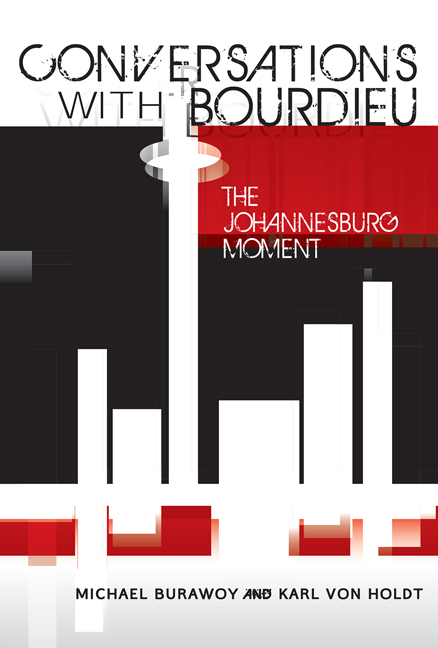Book contents
- Frontmatter
- Contents
- Abbreviations and acronyms
- Preface
- Prologue The Johannesburg Moment
- Acknowledgements
- CONVERSATION 1 SOCIOLOGY AS A COMBAT SPORT
- CONVERSATION 2 Theory and Practice
- CONVERSATION 3 CULTURAL DOMINATION
- CONVERSATION 4 COLONIALISM AND REVOLUTION
- CONVERSATION 5 PEDAGOGY OF THE OPPRESSED
- CONVERSATION 6 THE ANTINOMIES OF FEMINISM
- CONVERSATION 7 INTELLECTUALS AND THEIR PUBLICS
- CONVERSATION 8 MANUFACTURING DISSENT
- Burawoy Meets Bourdieu
- The Margin of Freedom
- Epilogue Travelling Theory
- Bibliography
- Index
The Margin of Freedom
from CONVERSATION 8 - MANUFACTURING DISSENT
Published online by Cambridge University Press: 20 April 2018
- Frontmatter
- Contents
- Abbreviations and acronyms
- Preface
- Prologue The Johannesburg Moment
- Acknowledgements
- CONVERSATION 1 SOCIOLOGY AS A COMBAT SPORT
- CONVERSATION 2 Theory and Practice
- CONVERSATION 3 CULTURAL DOMINATION
- CONVERSATION 4 COLONIALISM AND REVOLUTION
- CONVERSATION 5 PEDAGOGY OF THE OPPRESSED
- CONVERSATION 6 THE ANTINOMIES OF FEMINISM
- CONVERSATION 7 INTELLECTUALS AND THEIR PUBLICS
- CONVERSATION 8 MANUFACTURING DISSENT
- Burawoy Meets Bourdieu
- The Margin of Freedom
- Epilogue Travelling Theory
- Bibliography
- Index
Summary
Pascalian Meditations is, as Michael points out, Bourdieu's ‘ culminating theoretical work’, in which he draws together and elaborates on the core concepts developed in a lifetime's research and reflection, referring back as he does so to his wide-ranging empirical studies. The main force of the book's arguments is to explain the stability and durability of social order: field, habitus and symbolic violence form an interlocking whole that ensures the reproduction of existing hierarchies and social orders.
Yet there is an undercurrent to the main argument, or a counter-current, that emerges briefly but vividly at certain points – a probing of the conditions under which the weight of social order may be destabilised or challenged. Some of these concern the potential of a destabilised field, or a contradictory habitus, to generate dynamics of change; Michael and I touch on these in some of the pieces in this book. However, in the final chapter of Pascalian Meditations, Bourdieu returns to symbolic struggle, and in this account he introduces an entirely new dimension: the symbolic order constitutes a space of relative autonomy with a margin of freedom for redefining the world and opening up new possibilities:
But there is also the relative autonomy of the symbolic order, which, in all circumstances and especially in periods in which expectations and chances fall out of line, can leave a margin of freedom for political action aimed at reopening the space of possibles. Symbolic power, which can manipulate hopes and expectations, especially through a more or less inspired and uplifting performative evocation of the future – prophecy, forecast or prediction – can introduce a degree of play into the correspondence between expectations and chances and open up a space of freedom through the more or less voluntarist positioning of more less improbable possibles – utopia, project, programme or plan – which the pure logic of probabilities would lead one to regard as practically excluded (Bourdieu, 2000 [1997]: 234).
- Type
- Chapter
- Information
- Conversations with BourdieuThe Johannesburg Moment, pp. 198 - 209Publisher: Wits University PressPrint publication year: 2012



